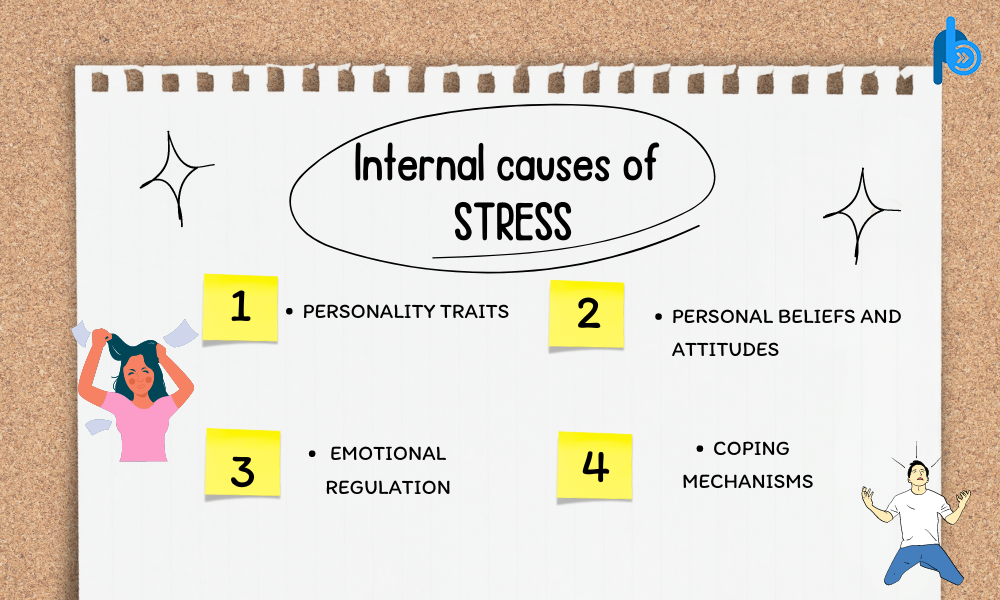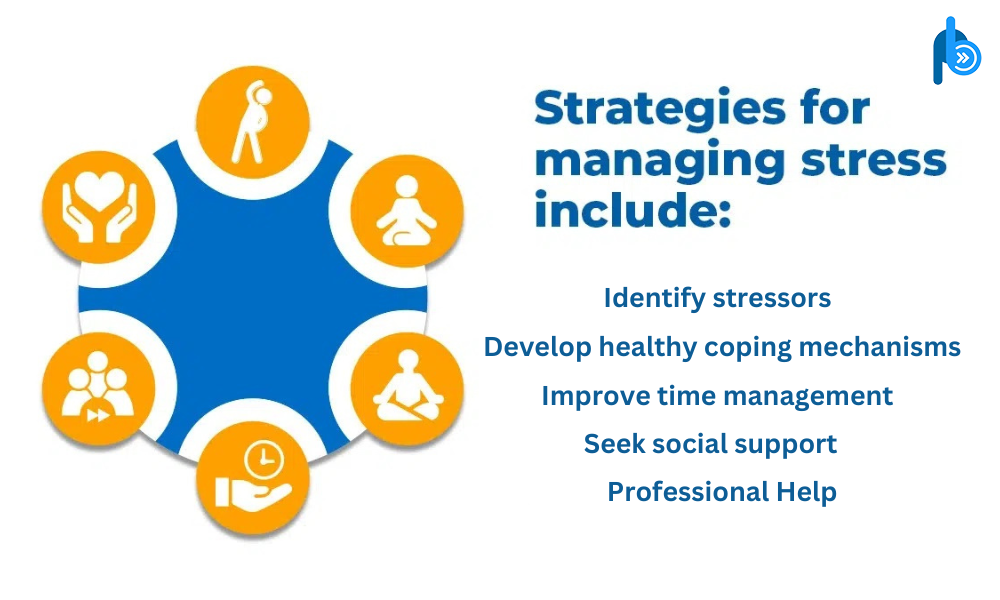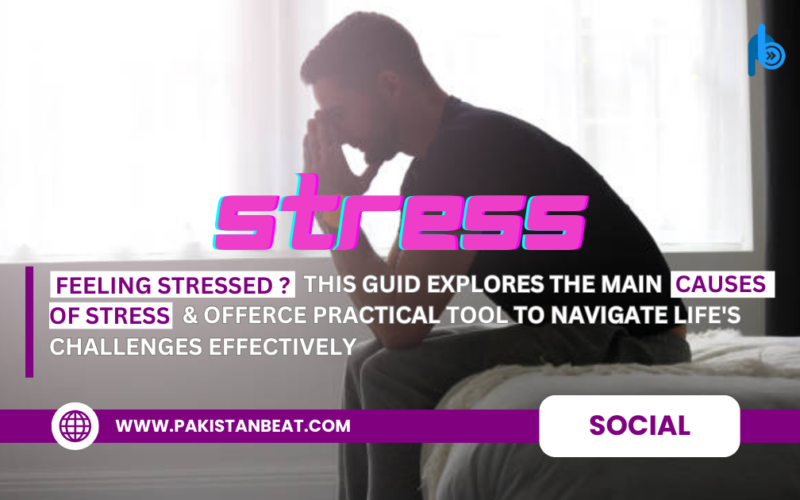Stress is frequently taking place, touching on each issue of our lives. From the pressures of difficult paintings to personal relationships, strain can feel overwhelming at times. By identifying the primary motives of strain, we’re able to discover effective stress awareness tips to manipulate it and lead extra-healthy, more balanced lives. In this newsletter, we’ll find out the interesting facts about stress and causes of stress and offer sensible recommendations for managing it.
What is Stress?
Stress is our body’s herbal response to any trade or project. When we’re dealing with a disturbing scenario, our bodies launch hormones like adrenaline and cortisol, which put us together to deal with the chance. This “fight or flight” reaction can be beneficial in quick bursts; however, even as strain becomes continuous, it could take a toll on our physical and intellectual fitness.
External Causes of Stress:

1. Work-Related Stress
Work is a huge source of strain for many human beings. Here are a few not-unusual painting-related stressors:
Workload: Overwhelming obligations and tight cut-off dates can leave us feeling exhausted and burned out which results in external causes of stress.
Job Security: Worries about losing our task or adjustments in our function can create regular anxiety and results in external causes of stress.
Workplace Stressors: Conflicts with colleagues or supervisors could make going to work an every-day struggle and results in external causes of stress.
Work-Life Balance: Juggling hobby obligations with personal lifestyles can cause you to feel stretched out and too skinny which results in external causes of stress.
Example: Imagine Sarah, an advertising manager who is handling more than one duty with tight deadlines. She frequently works late into the night, missing her own family dinners and feeling constantly exhausted. Her stress levels skyrocket as she tries to meet expectations at work while also being present for her own family.
2. Financial Stress
Money troubles are a primary stressor for the masses. Financial strain can come from:
Debt: Credit card debt, student loans, and particular economic responsibilities may be a heavy burden.
Living Expenses: Struggling to pay for rent, utilities, and groceries can cause ongoing fear.
Unexpected Costs: Sudden prices, which include medical payments or car maintenance, can disrupt our financial balance.
Example: John, a modern-day college graduate, is jogging hard to repay his student loans while additionally protecting his lease and other residing fees. An unexpected automobile repair bill adds to his strain, making it hard for him to be conscious of his artwork and experience his free time.
3. Health-Related Stress
Health worries, whether they are our own or those of loved ones, may be a considerable source of strain. This includes:
Chronic Illness: Managing prolonged-time fitness situations can be physically and emotionally draining.
Acute Illness: Sudden illnesses or accidents convey instantaneous strain and uncertainty.
Loved Ones’ Health: Worrying about the health of our own family members or close friends can weigh cautiously on us.
Example: Eiman, who is caring for her aged mother with Alzheimer’s, feels consistent pressure as she balances her caregiving obligations with her undertaking. She has issues about her mom’s health and her destiny, frequently feeling beaten and distant.
4. Relationship Stress
Relationships are a critical part of our lives, but additionally, they may be the number one source of pressure.
Romantic Relationships: Issues with an associate, which incorporate conflicts or a lack of resources, can create emotional turmoil.
Family Dynamics: Family conflicts, responsibilities, and caregiving may be disturbing.
Social Relationships: Problems with friends or feelings of loneliness and isolation can affect our intellectual health.
Example: Mike and Lisa, a married couple, are experiencing anxiety because of economic pressures and parenting disagreements. The pressure from their strained dating affects their mood and interactions with everyone, including their kids.
5. Environmental Stress
Our surroundings can substantially affect our pressure stages. Environmental stressors embody:
Noise Pollution: Constant loud noises can be overwhelming and cause growth strain.
Living Conditions: Poor dwelling conditions, overcrowding, and a lack of privacy can contribute to stress.
Natural Disasters: Experiencing or fearing natural screw-ups, together with earthquakes or floods, can cause outstanding anxiety.
Example: Raheel lives in a noisy, crowded condominium complex. The normal noise from buddies and the dearth of private areas makes it tough for her to lighten up, contributing to her everyday pressure.
Internal Causes of Stress

While outdoor elements are huge, our internal global environment additionally plays a crucial role in how we enjoy strain.
1. Personality traits
Certain male or female inclinations should make us more at risk of pressure.
Perfectionism: Striking for perfection can create constant stress and sadness results in internal causes of stress.
Pessimism: An awful outlook has to make it harder to cope with traumatic conditions resulting in internal causes of stress.
Type A Personality: Those with Type A personalities will be predisposed to be competitive and impatient, frequently experiencing better pressure stages results in internal causes of stress.
Example: Anna, a perfectionist, feels the amazing strain on every occasion she doesn’t reap her excessive necessities at work. She frequently remains absent due to redoing responsibilities, fearing any mistakes will reflect poorly on her.
2. Personal Beliefs and Attitudes
Our beliefs and attitudes can determine how we recognize and respond to pressure.
Rigid Beliefs: Holding inflexible ideals can cause stress, while reality doesn’t live up to our expectations.
Self-Esteem: Low arrogance could make us more sensitive to grievance and failure, increasing stress.
Example: David, who has low self-esteem, often second-guesses his capabilities at art. He feels pressured each time he gets feedback, decoding it as a signal of his inadequacy.
3. Emotional Regulation
How we manipulate our feelings extensively affects our stress ranges. Poor emotional regulation can cause:
Frequent Mood Swings: The inability to manipulate emotions can cause greater pressure.
Suppression of Emotions: Bottling up emotions in the desire to express them can increase pressure and tension over the years.
Example: Karen struggles with common temper swings, feeling glad one second and disturbing the following. Her loss of functionality to alter her emotions contributes to her stress, making it difficult for her to be conscious of her everyday responsibilities.
4. Coping Mechanisms
The techniques we use to deal with pressure can both help and hurt us. Unhealthy coping mechanisms encompass:
Substance Abuse: Using tablets or alcohol to deal with strain can cause dependency and, in addition, strain.
Avoidance: Avoiding issues in the vicinity of addressing them can bring about prolonged stress in the end.
Example: Tom turns to alcohol every time he feels stressed. While it gives a quick remedy, his eating behavior has commenced affecting his artwork and relationships, creating a cycle of stress.
The Impact of Chronic Stress
Chronic pressure takes place while stressors persist, maintaining the frame in a regular state of alertness. This can bring about extreme physical and mental fitness problems.
Physical Health
Chronic strain can cause some physical health issues, which include:
- Prolonged stress will increase the chance of coronary heart disease, high blood pressure, and strokes.
- Chronic stress weakens the immune system, making us more susceptible to illnesses.
- Stress can result in belly aches, ulcers, and irritable bowel syndrome (IBS).
- The results of continual pressure on highbrow fitness are, in addition, concerning:
- Anxiety and depression Persistent pressure can result in tension problems and melancholy.
- Cognitive Decline: Stress can impair interest, reminiscence, and selection-making capabilities.
Interesting Facts About Stress: Effective Stress Management Strategies

Understanding the reasons for strain is the first step to dealing with it. Here are some realistic strategies to help lessen strain and enhance well-being:
1. Identify Stressors.
Keep a journal to record your stressors and the way you respond to them. This lets you understand patterns and growth techniques to control them more successfully.
2. Develop Healthy Coping Mechanisms.
Adopting healthy coping mechanisms can extensively lessen strain degrees.
Hobbies and Interests: Engaging in sports you revel in can provide an intellectual break from stressors.
3. Improve Time Management.
Effective time control can help you feel more in control of your day.
Prioritize Tasks: Focus on the most vital duties first.
Break Tasks into Steps: Tackle huge obligations with the resource of breaking them into smaller, possible steps.
Delegate: Don’t be afraid to ask for help if you wish.
4. Seek Social Support.
Connecting with friends, a circle of relatives, or resource corporations can provide emotional guidance and reduce feelings of isolation. Sharing your reviews with others can help you gain new perspectives on dealing with strain.
5. Professional Help
If stress becomes overwhelming, seeking out assistance from an intellectual fitness expert can be useful. Therapies combined with cognitive-behavioral therapy (CBT) can offer gear and techniques to manipulate strain more efficiently.
6. Healthy lifestyle choices
Adopting a healthy lifestyle could have a giant effect on strain degrees.
Eating a nutritious diet can help stabilize temper and power ranges.
Ensuring you get sufficient sleep is critical for managing stress.
Reducing the intake of caffeine, nicotine, and exclusive stimulants can assist lower stress tiers. Regular physical hobbies can reduce strain hormones and beautify temper.
Practices like mindfulness and meditation can help calm the mind and reduce strain.
Conclusion:
Stress is a complex and multifaceted experience that influences anyone in any case. By knowing the primary causes of stress and pressure—whether or not they stem from artwork, financial troubles, health issues, relationships, or inner factors—we are able to better cope with and control it. Effective stress management techniques require a holistic approach, combining healthy coping mechanisms, lifestyle changes, and, at the same time.
More Relatable Blogs from this Autor:



























